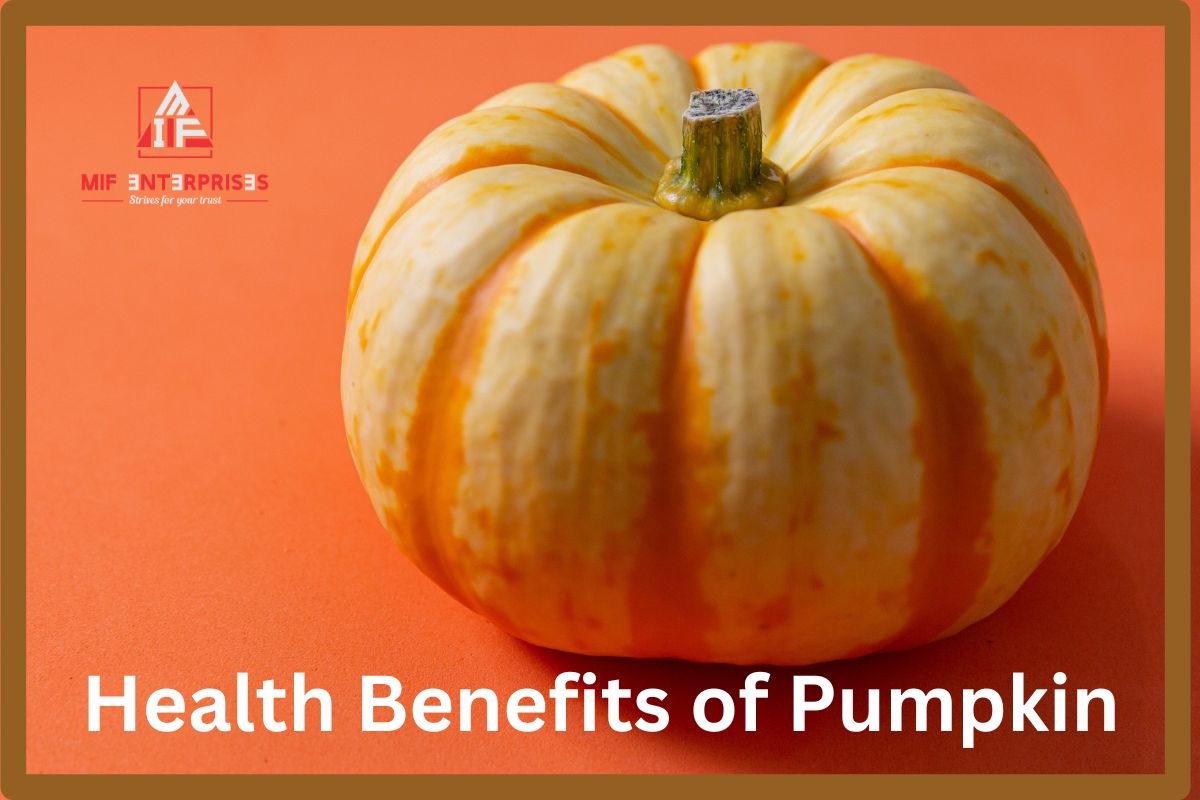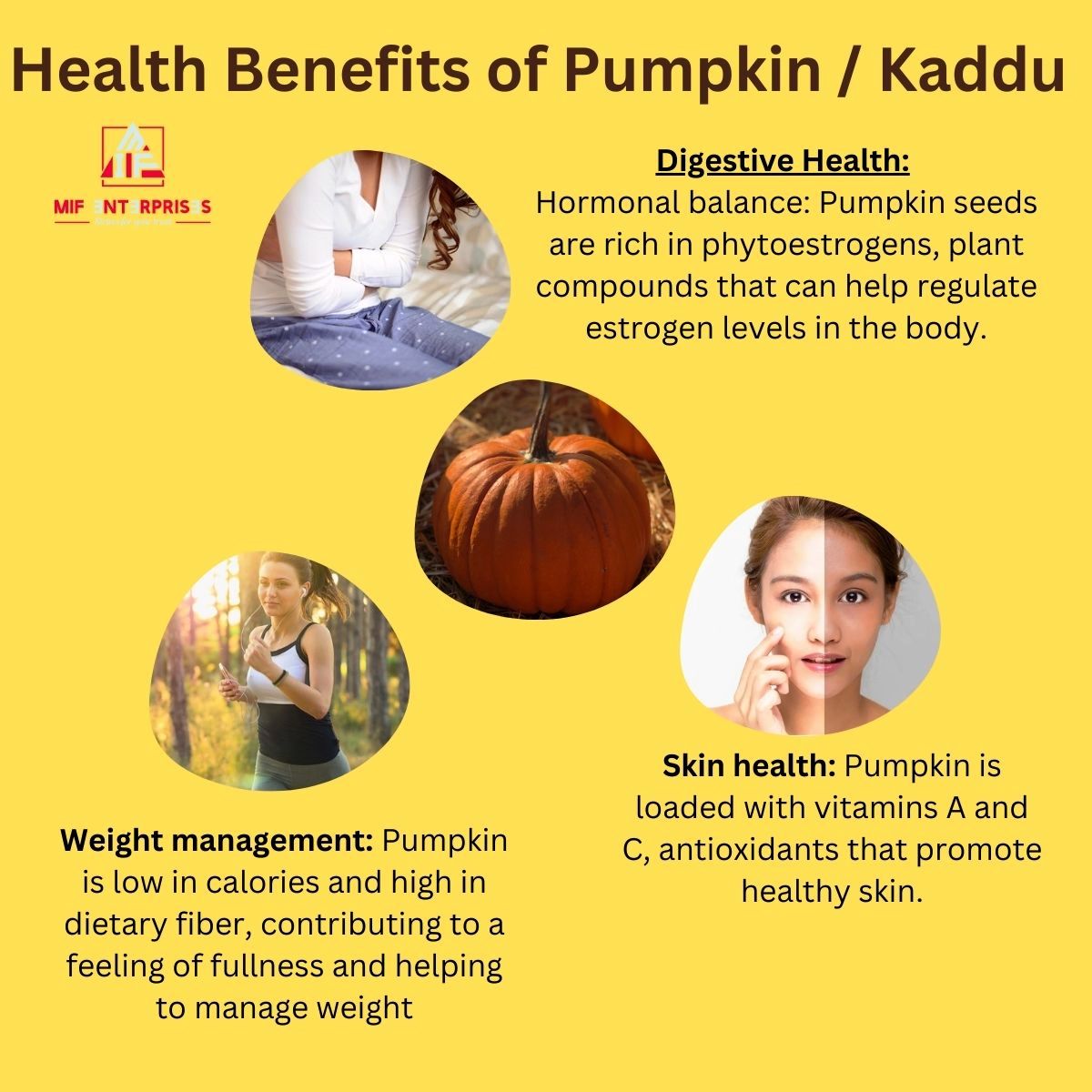In this article you will get the valuable information on Pumpkin Benefits, Pumpkin Seeds Benefits, Is Pumpkin Fattening, Pumpkin Juice Benefits, How To Eat Pumpkin, Pumpkin Recipes, Pumpkin Benefits For Female, Pumpkin Benefits Side Effects, Pumpkin Benefits For Male, Pumpkin Benefits And Side Effects, Pumpkin Benefits For Skin, Green Pumpkin Benefits, and many more.
Ignite Your Wellness Journey: Discover the Transformative Health Benefits of Pumpkin / Kaddu in 2023
When it comes to improving digestive health and fortifying your bones, pumpkin takes the spotlight. This versatile vegetable delights in captivating our taste buds while bestowing incredible benefits. Its rich dietary fiber content promotes regularity and nourishes the gut microbiota, ensuring a harmonious digestive system. Additionally, pumpkin’s remarkable reserves of calcium and magnesium contribute to optimal bone health, lending strength and vitality to your skeletal framework. Incorporate pumpkin into your diet and revel in the dual marvels of enhanced digestion and fortified bones, all through the enigmatic allure of this remarkable gourd.
Pumpkin / Kaddu Other Names;
| Sl. No. | Name | Region |
| 1 | Pumpkin | Global |
| 2 | Squash | North America |
| 3 | Calabaza | Latin America |
| 4 | Kabocha | (Japan |
| 5 | Butternut squash | United Kingdom |
| 6 | Cucurbita pepo | Scientific name |
| 7 | Potiron | France |
| 8 | Zucca | Italy |
| 9 | Kürbis | Germany) |
| 10 | Ayote | Central America |
| 11 | Cucurbita maxima | Scientific name |
| 12 | Hubbard squash | United States |
| 13 | Cucurbita moschata | Scientific Name |
| 14 | Zapallo | Argentina |
| 15 | Delica squash | Australia |
| 16 | Cucurbita argyrosperma | Scientific Name |
| 17 | Lumbo | Philippines |
| 18 | Winter squash | General term |
| 19 | Hokkaido pumpkin | Finland |
| 20 | Acorn squash | United States |
| 21 | Kaddu | Hindi / Urdu |
The Nutritional Values Of Pumpkin (Cooked Pumpkin)(approximately 1 Cup, mashed);
Calories: A serving of cooked pumpkin contains around 49 calories, making it a relatively low-calorie food.
Carbohydrates: Pumpkin is a good source of carbohydrates, providing approximately 12 grams per serving. These carbs include dietary fiber, which aids digestion and promotes a feeling of fullness.
Vitamins: Pumpkin is rich in various vitamins. It is particularly abundant in vitamin A, with over 200% of the recommended daily intake (RDI) in a single serving. Vitamin A is essential for eye health, immune function, and growth. Additionally, pumpkin contains vitamins C, E, and some B vitamins, which contribute to overall health and well-being.
Minerals: Pumpkin is a noteworthy source of minerals. It is high in potassium, which helps maintain fluid balance and supports proper heart and muscle function. Additionally, it contains beneficial amounts of magnesium, iron, and zinc, all of which play vital roles in numerous bodily processes.
Antioxidants: The vibrant orange color of pumpkin signifies the presence of antioxidants, such as beta-carotene. These antioxidants help neutralize harmful free radicals, protecting cells from oxidative damage and reducing the risk of chronic diseases.
Note: Furthermore, Pumpkin Contains Small Amounts of Protein And Healthy Fats, Which, Combined With Its Low Calorie Content, Make It A Nutritious Choice For Various Dietary Needs.
It’s important to note that these nutritional values may vary slightly depending on the specific variety of pumpkin and the cooking method used. Nonetheless, incorporating pumpkin into your diet can provide a range of health benefits due to its impressive nutritional profile.
Pumpkin Benefits for Women
- Hormonal balance: Pumpkin seeds are rich in phytoestrogens, plant compounds that can help regulate estrogen levels in the body. This may contribute to hormonal balance and alleviate symptoms associated with hormonal fluctuations, such as PMS and menopause.
- Skin health: Pumpkin is loaded with vitamins A and C, antioxidants that promote healthy skin. These vitamins support collagen production, helping to maintain skin elasticity and reduce the appearance of wrinkles. Additionally, the antioxidants in pumpkin protect the skin from damage caused by free radicals, resulting in a more youthful complexion.
- Heart health: Pumpkin is low in saturated fat and cholesterol, making it heart-friendly. The potassium content in pumpkin can help regulate blood pressure levels, reducing the risk of cardiovascular diseases. The dietary fiber found in pumpkin can also aid in maintaining healthy cholesterol levels.
- Bone health: Pumpkin is a good source of minerals like calcium and magnesium, which are essential for bone health. Consuming pumpkin regularly can help strengthen bones, potentially reducing the risk of osteoporosis, a condition more common in women.
- Weight management: Pumpkin is low in calories and high in dietary fiber, contributing to a feeling of fullness and helping to manage weight. Its natural sweetness can satisfy cravings for sugary treats, making it a healthier alternative in various recipes.
- Boosted immune system: Pumpkin is packed with vitamins and antioxidants that support a strong immune system. Vitamin C enhances immune function, while antioxidants like beta-carotene and vitamin E help protect cells from damage and strengthen the body’s defense against infections and diseases.
Note: Incorporating pumpkin into a balanced diet can provide women with these beneficial effects, promoting their overall health, beauty, and vitality.
Pumpkin Benefits for Men
- Prostate health: Pumpkin seeds are known for their potential benefits in promoting prostate health. They contain phytosterols, which are plant compounds that may help in maintaining a healthy prostate and reducing the risk of prostate issues.
- Testosterone support: Pumpkin seeds are a natural source of zinc, a mineral essential for testosterone production. Adequate zinc intake is crucial for maintaining healthy testosterone levels, which play a vital role in men’s reproductive health and overall well-being.
- Heart health: Pumpkin is low in saturated fat and cholesterol while being rich in heart-healthy nutrients. The potassium content in pumpkin can help regulate blood pressure, reducing the risk of cardiovascular diseases. The dietary fiber found in pumpkin can also contribute to maintaining healthy cholesterol levels.
- Energy and vitality: Pumpkin is a nutrient-dense food that provides a good source of carbohydrates, essential vitamins, and minerals. These nutrients support energy production, physical endurance, and overall vitality, helping men stay active and perform at their best.
- Weight management: Pumpkin is low in calories and high in dietary fiber, making it a beneficial food for weight management. The fiber content promotes a feeling of fullness, reducing overeating and aiding in weight control.
- Eye health: Pumpkin is rich in vitamin A and antioxidants like beta-carotene, which are beneficial for maintaining healthy eyesight. Adequate intake of these nutrients can support vision health and reduce the risk of age-related macular degeneration.
Note: Incorporating pumpkin into a well-rounded diet can provide these benefits for men, contributing to their overall health, vitality, and longevity.
Pumpkin Benefits for Children
- Essential nutrients: Pumpkin is packed with essential nutrients that are vital for children’s growth and development. It is a great source of vitamins A and C, which support immune function, eye health, and collagen production. Pumpkin also provides minerals like potassium, magnesium, and iron, which are important for overall health and proper bodily functions.
- Healthy digestion: Pumpkin is rich in dietary fiber, which aids in maintaining healthy digestion for children. It can help prevent constipation and promote regular bowel movements, ensuring a healthy digestive system.
- Immune support: The high vitamin content in pumpkin, particularly vitamin A and vitamin C, helps boost children’s immune systems. A strong immune system can better defend against common illnesses and infections.
- Healthy vision: The beta-carotene found in pumpkin is converted into vitamin A in the body, which is crucial for children’s vision health. Consuming pumpkin can contribute to maintaining good eyesight and healthy retinal function.
- Growth and development: Pumpkin is a nutrient-dense food that provides important vitamins, minerals, and antioxidants necessary for children’s growth and development. These nutrients support bone health, cognitive function, and overall physical and mental well-being.
- Nutritious snack option: Pumpkin can be incorporated into child-friendly snacks, such as pumpkin muffins, roasted pumpkin seeds, or pumpkin smoothies. These snacks offer a healthier alternative to processed and sugary treats, providing valuable nutrients while satisfying their taste buds.
Note: It’s important to introduce pumpkin in age-appropriate forms and textures suitable for children. By including pumpkin in their diet, parents can provide their children with a variety of health benefits and encourage a well-rounded and nutritious eating habit.
General Guidelines Regarding Pumpkin / Kaddu Dosage
- Serving size: A typical serving of cooked pumpkin is around 1 cup (approximately 245 grams). This can be used as a reference when incorporating pumpkin into meals or recipes.
- Age considerations: For infants and young children, it’s best to introduce solid foods gradually, including pumpkin, after consulting with a pediatrician. As children grow, their portions can increase gradually based on their appetite and dietary needs.
- Individual tolerance: Pay attention to individual tolerances and reactions. Some people may have specific sensitivities or allergies to pumpkin or related foods. If any adverse reactions occur, such as digestive discomfort or allergic symptoms, discontinue consumption and seek medical advice if needed.
- Balanced diet: Pumpkin should be included as part of a balanced diet along with a variety of other fruits, vegetables, whole grains, proteins, and healthy fats. It should not replace other essential food groups but rather complement them.
- Nutritional diversity: While pumpkin offers various health benefits, it’s important to consume a diverse range of fruits and vegetables to ensure a well-rounded intake of essential nutrients.
- Moderation: Although pumpkin is highly nutritious, moderation is key. Excessive consumption of any single food may lead to an imbalance in overall nutrient intake. Incorporate pumpkin as part of a varied diet and consume it in moderation.
Note: As always, it is advisable to consult with a healthcare professional or registered dietitian for personalized dietary advice, especially if you have any specific health conditions, allergies, or concerns. They can provide guidance tailored to your individual needs and help you incorporate pumpkin into your diet in a safe and beneficial manner.
Pumpkin / Kaddu Precautions to Consider
- Allergies: Some individuals may have allergies to pumpkin or other members of the gourd family, such as cucumbers or melons. If you have a known allergy to these foods, it is important to avoid consuming pumpkin or its derivatives.
- Digestive issues: Pumpkin contains dietary fiber, which can be beneficial for most people. However, for individuals with certain digestive conditions, such as irritable bowel syndrome (IBS) or other gastrointestinal disorders, high-fiber foods like pumpkin may trigger symptoms. Monitor your tolerance and adjust your intake accordingly.
- Interactions with medications: If you are taking any medications, especially blood thinners or anticoagulants, it’s advisable to consult your healthcare provider before consuming large amounts of pumpkin or pumpkin seeds. Pumpkin seeds have natural blood-thinning properties, which may interact with certain medications.
- Pesticides and contaminants: When purchasing pumpkin, opt for organic varieties whenever possible to minimize exposure to pesticides. Additionally, ensure that the pumpkin is fresh and free from mold or signs of spoilage.
- Cross-contamination: If you have a severe allergy to pumpkin or related foods, be cautious of cross-contamination in food preparation areas. Ensure that utensils, cutting boards, and surfaces are thoroughly cleaned to avoid any potential traces of pumpkin.
- Moderation in carving activities: During pumpkin carving for seasonal festivities, exercise caution to prevent injuries. Use appropriate tools, handle sharp objects safely, and supervise children to avoid accidents.
Remember, these precautions are general guidelines, and individual circumstances may vary. It is always recommended to consult with a healthcare professional or registered dietitian for personalized advice, especially if you have specific health concerns or dietary restrictions.
How to Consume Pumpkin / Kaddu to Enjoy Their Benefits
- Cooking: Pumpkin can be cooked in different ways, including boiling, steaming, roasting, or sautéing. Cooked pumpkin can be mashed, pureed, or used as an ingredient in soups, stews, curries, or casseroles.
- Baking: Pumpkin is commonly used in baking recipes, such as pumpkin pies, muffins, bread, cakes, or cookies. Canned pumpkin puree is often a convenient option for baking purposes.
- Roasting seeds: Pumpkin seeds can be extracted from the pumpkin, cleaned, and roasted for a delicious and nutritious snack. Toss the seeds in oil and spices of your choice, then roast them in the oven until golden brown and crispy.
- Smoothies: Incorporating pumpkin into smoothies is a great way to enjoy its nutritional benefits. Blend cooked pumpkin with other fruits, vegetables, yogurt, milk, or plant-based alternatives to create a creamy and nutritious beverage.
- Pumpkin soups: Pumpkin can be the star ingredient in flavorful and comforting soups. Simmer cooked pumpkin with vegetable broth, spices, and other ingredients of your choice to create a hearty and nutritious soup.
- Side dishes: Pumpkin can be served as a tasty and nutritious side dish. It can be sautéed with other vegetables, added to grain-based salads, or used as a filling for stuffed dishes.
- Desserts: Indulge in pumpkin-flavored desserts like pumpkin cheesecake, pumpkin pudding, or pumpkin ice cream. These treats are a delightful way to enjoy the sweet and earthy flavors of pumpkin.
Frequently Asked Questions and Their Answers
Q1: What are the health benefits of pumpkin?
Answer: Pumpkin offers a range of health benefits, including promoting healthy vision, boosting the immune system, aiding digestion, and supporting bone health. It is also rich in antioxidants and essential nutrients.
Q2: How can I incorporate pumpkin into my diet?
Answer: Pumpkin can be incorporated into your diet in various ways. You can enjoy pumpkin in soups, stews, roasted dishes, baked goods, smoothies, or as a delicious pumpkin puree.
Q3: Is pumpkin good for weight loss?
Answer: Yes, pumpkin is a great addition to a weight loss diet. It is low in calories and high in dietary fiber, which helps promote satiety and supports healthy digestion.
Q4: Does pumpkin have any skin benefits?
Answer: Absolutely! Pumpkin is rich in vitamins A and C, which can help promote healthy skin. It may contribute to a brighter complexion, improved skin texture, and a youthful appearance.
Q5: Can pumpkin seeds be eaten?
Answer: Yes, pumpkin seeds are highly nutritious and can be eaten. They are a great source of healthy fats, fiber, protein, and various minerals. Roasted pumpkin seeds make a delicious and nutritious snack.
Q6: Are there any allergy risks associated with pumpkin?
Answer: While pumpkin allergies are rare, some individuals may experience cross-reactivity if they are allergic to other members of the Cucurbitaceous family, such as melons or cucumbers. If you have known allergies, it’s best to consult with a healthcare professional.
Q7: Is pumpkin safe for diabetic individuals?
Answer: Pumpkin is relatively low in carbohydrates and has a low glycemic index, making it a suitable option for diabetic individuals when consumed in moderation. However, it’s always advisable to consult a healthcare professional regarding your specific dietary needs.
Q8: Can pumpkin benefit heart health?
Answer: Yes, pumpkin contains fiber, potassium, and antioxidants, all of which contribute to heart health. Consuming pumpkin as part of a balanced diet may help in managing blood pressure and reducing the risk of cardiovascular diseases.
Q9: Does pumpkin have any impact on eye health?
Answer: Pumpkin is an excellent source of beta-carotene, which the body converts into vitamin A. Vitamin A is essential for maintaining good vision and overall eye health.
Q10: Can pumpkin be beneficial for digestion?
Answer: Yes, pumpkin is rich in dietary fiber, which aids digestion and promotes regular bowel movements. It can help alleviate constipation and support a healthy gut microbiome.
Pumkin / Kaddu is Available in other Sources
Pumpkin Seed Oil Capsules For Hair Growth
Pumpkin Seed Extract For Bladder Control
Pumpkin Seed Extract And Soy Germ
Disclaimer: The following home remedies are provided for informational purposes only and should not be considered a substitute for professional medical advice. These remedies are not intended to diagnose, treat, cure, or prevent any disease. It is important to consult with a qualified healthcare provider before attempting any home remedies, especially if you have underlying health conditions, are taking medications, or are pregnant or breastfeeding. Individual results may vary, and the use of these remedies is at your own risk. The information provided is based on general knowledge and traditional uses, and its accuracy or effectiveness cannot be guaranteed.
Must Read Our Key Informational Articles
Health Benefits of Black Seed / Kalonji



5 thoughts on “Ignite Your Wellness Journey: Discover the Transformative Health Benefits of Pumpkin / Kaddu in 2023”